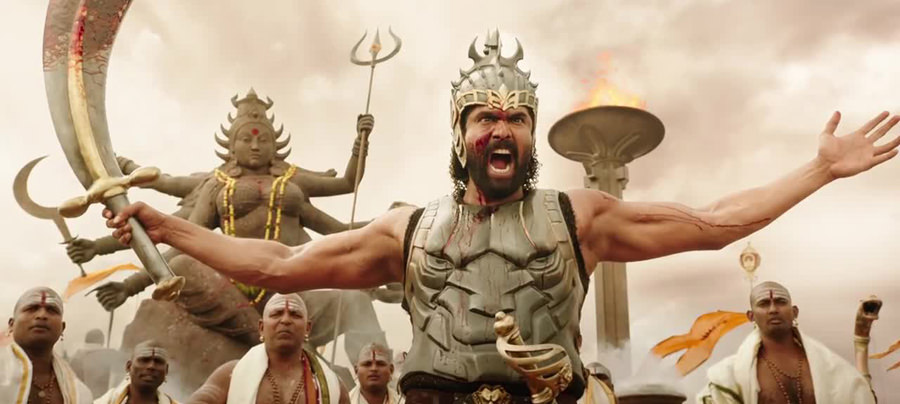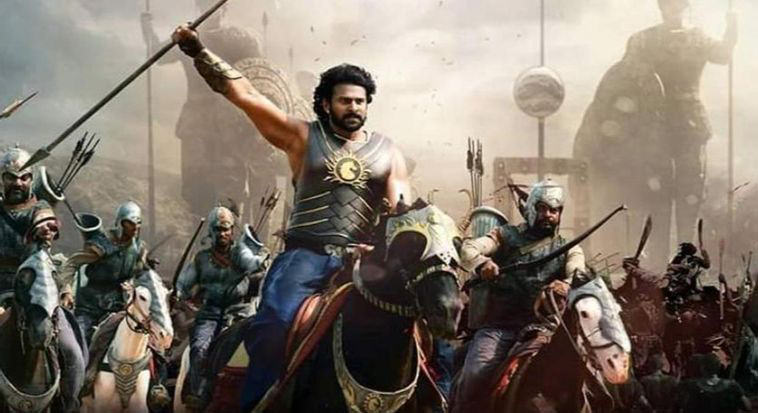Baahubali: The Beginning
Directed by S.S. Rajamouli (2015) ***
 Through the medium of opera, Richard Wagner presented his idea of the Gesamtkunstwerk (“total work of art”); he demonstrated that the presentation and experience of opera could encompass both the written word and spectacular visuals, both drama and music. One wonders what he would have thought of Indian film director S.S. Rajamouli’s Telugu-language Baahubali movies, which are exercises in grand synthesis. The Beginning is all at once a musical (with much choreographed dancing), an action film, a superhero film of sorts, a war film, a romance and a political drama, mixing and mashing tropes and styles from a hundred and thirty years of cinema to create entertainment on an awesome scale. The writing of the script also mixes inspirations from disparate sources, from the ancient Sanskrit epic, Mahabharata, to the Immortal Picture Stories Indian comics and graphic novels that Rajamouli read as a child, based on folktales, religious legends and epics. All of these attributes give Baahubali: The Beginning the feeling of a legendary tale by way of Joseph Campbell and George Lucas, Robin Hood and the Old Testament.
Through the medium of opera, Richard Wagner presented his idea of the Gesamtkunstwerk (“total work of art”); he demonstrated that the presentation and experience of opera could encompass both the written word and spectacular visuals, both drama and music. One wonders what he would have thought of Indian film director S.S. Rajamouli’s Telugu-language Baahubali movies, which are exercises in grand synthesis. The Beginning is all at once a musical (with much choreographed dancing), an action film, a superhero film of sorts, a war film, a romance and a political drama, mixing and mashing tropes and styles from a hundred and thirty years of cinema to create entertainment on an awesome scale. The writing of the script also mixes inspirations from disparate sources, from the ancient Sanskrit epic, Mahabharata, to the Immortal Picture Stories Indian comics and graphic novels that Rajamouli read as a child, based on folktales, religious legends and epics. All of these attributes give Baahubali: The Beginning the feeling of a legendary tale by way of Joseph Campbell and George Lucas, Robin Hood and the Old Testament.
 International superstar Prabhas plays a double role as father Amarendra Baahubali and son Mahendra (Shivu), living during the time of the ancient kingdom of Mahishmati. We first see Mahendra as a baby being scurried away by a woman unknown who, even after she kills two pursuing soldiers to protect the baby, is drowned in a river — but not before calling on Lord Shiva that the baby should survive. Mahendra is brought up as an orphan by the Amburi tribe who live at the bottom of a monstrous mountain waterfall. All through his youth, Shivu attempts to climb the waterfall precipice, determined to discover what lies beyond it. By adulthood, Shivas is extraordinarily strong and care-free; the well-cast Prabhas plays the part with nonchalant exuberance. When a metal mask makes its way down the waterfall, Shivu is even more determined to make his way to the top.
International superstar Prabhas plays a double role as father Amarendra Baahubali and son Mahendra (Shivu), living during the time of the ancient kingdom of Mahishmati. We first see Mahendra as a baby being scurried away by a woman unknown who, even after she kills two pursuing soldiers to protect the baby, is drowned in a river — but not before calling on Lord Shiva that the baby should survive. Mahendra is brought up as an orphan by the Amburi tribe who live at the bottom of a monstrous mountain waterfall. All through his youth, Shivu attempts to climb the waterfall precipice, determined to discover what lies beyond it. By adulthood, Shivas is extraordinarily strong and care-free; the well-cast Prabhas plays the part with nonchalant exuberance. When a metal mask makes its way down the waterfall, Shivu is even more determined to make his way to the top.
Shivu eventually finds himself involved in a world of political intrigue, falling for a ferocious-in-battle warrior, Avanthika (Tamannaah), part of a resistance tribe fighting the evil king of Mahishmati, Lord Bhallaladeva (Rana Daggubati), and hoping to rescue the captive Devasena (Anushka Shetty).
 Baahubali: The Beginning can be a confounding movie, though never less than entertaining. M. M. Keeravani’s music score, while writ large, has a synthesizer base which sounds cheap. The movie’s saturated use of CGI (used in seemingly nearly every scene), is often unconvincing — and yet, story elements are often so preposterous (in a good way) that the viewer doesn’t mind. The color schemes are sometimes tacky, in a Thomas Kinkade sort of way, and yet the cinematography is crystal clear and the story so fanciful that, again, we accept it. The ambitiousness of Rajamouli’s vision carries the movie’s faults. The humongous set design for the city of Mahishmati is like something out of Cecil B. Demille’s The Ten Commandments or D.W. Griffith’s Intolerance. The battle sequences are jaw-dropping, showing an army of 100,000 soldiers racing across a dust-stirred battlefield. A horse drawn-chariot featuring a front-placed spinning blade to ward off attackers is like a weapon from Ben Hur by way of Mad Max. Impossible, wuxia-style stunts and superhuman feats, detailed in blood-drenched slow motion, are par for the course here; I don’t know that I’ve seen a film with so many soldiers flying through the air. No matter how violent the film becomes, though, it’s still an old-fashioned, good-natured adventure story with something to please nearly every kind of film watcher. Its 158 minutes don’t slow down.
Baahubali: The Beginning can be a confounding movie, though never less than entertaining. M. M. Keeravani’s music score, while writ large, has a synthesizer base which sounds cheap. The movie’s saturated use of CGI (used in seemingly nearly every scene), is often unconvincing — and yet, story elements are often so preposterous (in a good way) that the viewer doesn’t mind. The color schemes are sometimes tacky, in a Thomas Kinkade sort of way, and yet the cinematography is crystal clear and the story so fanciful that, again, we accept it. The ambitiousness of Rajamouli’s vision carries the movie’s faults. The humongous set design for the city of Mahishmati is like something out of Cecil B. Demille’s The Ten Commandments or D.W. Griffith’s Intolerance. The battle sequences are jaw-dropping, showing an army of 100,000 soldiers racing across a dust-stirred battlefield. A horse drawn-chariot featuring a front-placed spinning blade to ward off attackers is like a weapon from Ben Hur by way of Mad Max. Impossible, wuxia-style stunts and superhuman feats, detailed in blood-drenched slow motion, are par for the course here; I don’t know that I’ve seen a film with so many soldiers flying through the air. No matter how violent the film becomes, though, it’s still an old-fashioned, good-natured adventure story with something to please nearly every kind of film watcher. Its 158 minutes don’t slow down.
Baahubali is a film that didn’t go unnoticed. It was the most expensive Indian movie made at the time of its release, and became the highest-grossing film in India, while receiving critical acclaim around the world. I look forward to entering this serialized world again when I watch and review the nearly three-hour Baahubali 2: The Conclusion
—Michael R. Neno, 2021 Mar 15